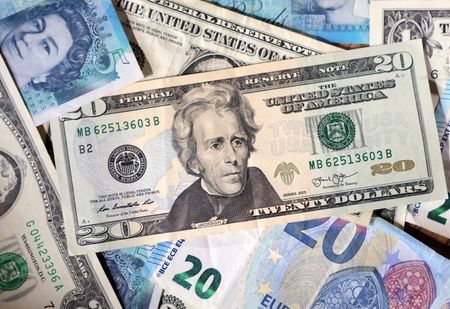By Lucy Raitano and Gertrude Chavez-Dreyfuss
LONDON/NEW YORK (Reuters) -The U.S. dollar declined again on Tuesday, weighed down in part by the Federal Reserve’s caution over the economy, while traders looked ahead to upcoming U.S. talks with Japan that could include discussions on currencies and volatility.
The dollar sold off broadly on Monday following last Friday’s downgrade of the U.S. sovereign rating by Moody’s on deficit concerns. Now attention turns to a critical vote in Washington over U.S. President Donald Trump’s sweeping tax cuts.
“The Moody’s downgrade was the catalyst earlier pushing yields higher and the dollar lower. Now yields have come off those highs and the dollar is still lower,” said Vassili Serebriakov, currency strategist, at UBS in New York.
“This highlights the underlying bias to sell the dollar. I don’t think that bias has changed.”
Fed officials speaking on Monday talked about the ramifications of the latest downgrade of the U.S. government’s credit rating and unsettled market conditions as they continued to navigate a very uncertain economic environment.
The next Fed speakers on Tuesday, however, are unlikely to offer much new.
In late morning trading, the dollar slipped against the yen, falling to a roughly two-week low of 144.095 yen. It was last down 0.1% at 144.64 yen, sliding in five of the last six sessions.
Tuesday’s sell-off in long-dated Japanese government bonds, that pushed 30-year yields to record highs and those on the 20-year to a nearly 25-year peak, pressured the yen earlier, analysts said. The yen has since recovered, however.
Also on traders’ radar is news around upcoming U.S.-Japan talks, with Japanese Finance Minister Katsunobu Kato saying on Tuesday he expects any meeting with U.S. Treasury Secretary Scott Bessent on exchange rates to be based on their shared view that excessive currency volatility was undesirable.
Kato and Bessent are expected to meet on the sidelines of a G7 finance leaders’ gathering to be held this week in Canada.
“Overhanging the FX market is that discussions in trade deals are going to include some currency component, which if it does is a dollar negative, because the U.S. wants a weaker dollar against Asian currencies to narrow the Asian trade surplus with the States,” said Chris Turner, head of FX strategy at ING.
Comments from Japan’s top trade envoy on Tuesday that Tokyo was firm in its anti-tariff stance pointed to no easy off-ramp in the negotiations in the weeks and months ahead.
Elsewhere, the Australian dollar fell sharply against the U.S. dollar after the Reserve Bank of Australia cut benchmark interest rates by 25 basis points and left the door open to further easing in the months ahead. The Aussie was last down 0.9% at US$0.6401.
Meanwhile, the Chinese yuan weakened against the dollar as China cut key benchmark lending rates while corporate seasonal demand for dollars remained high.
GLOOMY PICTURE
But traders remain focused on the U.S. economy, with Atlanta Federal Reserve President Raphael Bostic telling CNBC on Monday the U.S. central bank may only be able to cut interest rates by a quarter point over the rest of the year given concerns about rising inflation stoked by higher tariffs.
Trump is also expected to join the congressional debate over his tax bill on Tuesday. The vote comes after Moody’s stripped the U.S. government of its top-tier credit rating, citing concerns over the nation’s growing $36.2 trillion debt pile.
Trump’s bill would add $3 trillion to $5 trillion to the debt, according to nonpartisan analysts. Ballooning fiscal debt, trade frictions, and weakened confidence have weighed on U.S. assets. The U.S. dollar index has tumbled as much as 10.6% from its January highs, one of the sharpest retreats for a three-month period.
The dollar got a breather after Trump paused many of the largest tariffs he announced last month.
And in the wake of Trump’s tariff turmoil, Britain on Monday agreed to the most significant reset of defence and trade ties with the European Union since Brexit.
The pound was last flat at $1.3372 having risen 0.6% on Monday.
The euro, meanwhile, rose 0.2% against the dollar to $1.3373, while the Swiss franc strengthened, pushing the dollar down 0.4% at 0.8314 franc.
(Reporting by Lucy Raitano in London and Gertrude Chavez-Dreyfuss in New York; Additional reporting by Rocky Swift in Tokyo; Editing by Stephen Coates, David Evans, Alexandra Hudson and Tomasz Janowski)






